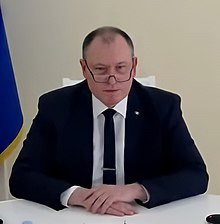 |
The Embassy of Moldova in Berlin |
Contact

Address: Gotlandstraße 16, 10439 Berlin, Germany
Tel.: + 49 30 44 652 970
Fax: + 49 30 44 652 972
The Ambassador
Amb. Aureliu Ciocoi
Aureliu Ciocoi was born in 1968 in Chisinau. From 1986 to 1988 he was a soldier with the KGB Soviet Border Troops. Between 1985 and 1992 he studied at the Faculty of Journalism and Communication Studies, Moldova State University. From 1992 to 1994 he studied International Relations in Bucharest. After the collapse of the Soviet Union, he became a journalist for several daily newspapers. From 2010 to 2015 he worked as ambassador to Germany and Denmark and from 2015 to 2017 in China and Vietnam. He was also briefly Ambassador to the United States in 2017. From 2018 to 2019 he was an advisor to President Igor Dodonon foreign policy issues. Ciocoi held the post of Foreign Minister between November 14, 2019 and March 16, 2020. From December 31, 2020 to August 6, 2021, he was Acting Prime Minister of the Republic of Moldova. He has been the Republic of Moldova's ambassador to the Federal Republic of Germany since April 7, 2022.
History
The Federal Republic of Germany acknowledged the independence of the Republic of Moldova on December 14th 1991, and diplomatic relations between the two countries was established on the 30th of April 1992. The opening of the diplomatic missions – of the Embassy of the Federal Republic of Germany in Chişinău, on November 2nd 1992, and of the Embassy of the Republic of Moldova in Bonn, on March 28th 1995, - definitively confirmed both states' interest for the extension and deepening of the bilateral collaboration.
Since then the Moldovan-German relations have continued to strengthen. The Republic of Moldova deeply acknowledges Germany’s assistance within international and European organizations, particularly in the process of implementing democratic and economic reforms for the purpose of the country's European integration. Germany played an important role in the adherence of the Republic of Moldova to the Stability Pact for South-Eastern Europe, the World Trade Organization, in the invitation forwarded to our country to the European Conference, as well as in the drafting and endorsement of the Action Plan: Republic of Moldova – European Union. To this end, of critical importance was the May 6th 2004 Bundestag motion, ‘Supporting Moldova’s Way towards Reunification and Democratization’, which lays out four key goals of the German and European policy with regard to Moldova, notably democratic and rule-of-law consolidation, sustainable economic growth, Transnistrean conflict resolution, and further entrenched relations between Moldova and the European Union. The bilateral political contacts have been intense and productive.
The Moldovan-German relations have also experienced a continuous development in the economic field. Germany is one of Moldova’s key commercial partners ranking fifth in terms of the commercial exchange of Moldova and second amongst the EU members. The major Moldovan goods exported to the FRG are textiles, leather articles, foods, alcohol and tobacco products. The major goods imported from Germany are electronic devices and machinery, textiles, cars and spare parts, chemical products, plastic and rubber articles.
The cultural relations between the Republic of Moldova and Germany, best exemplified by the organization of the Days of Moldovan Culture in Germany in 1998. The Cultural Society ‘Moldova’ operating in Germany focuses on promoting the cultural and spiritual values of the Republic of Moldova, and September 2004 the “Society of Moldovans in Germany” was created, which unites members of the Moldovan diaspora in the FRG.
An important role in this respect is also played by the Union of Basarabean Germans, whose representatives, German nationals with Basarabean roots, who returned to Germany in the years 1939-1940, often visit Moldova with the aim of granting humanitarian relief, especially to the localities of their origin.
The bilateral cooperation in the field of science and education has been functioning on the basis of the 1998 Protocol. It provides for the direct collaboration between the German Academic Exchange Service (DAAD) and the Ministry of Education of the Republic of Moldova, as well as between the Conference of University Rectors (HRK) and the Rectors’ Council from the Republic of Moldova. Germany has thus far been consistent in offering many studying and scientific research scholarships to Moldovan students, scientists, and practitioners.
The Republic of Moldova pays exceptional attention to developing its relations with Germany. It places a premium on these relations in the process of Moldova’s economic and democratic consolidation, as well as the EU integration.
The Embassy of the Republic of Moldova to Germany protects and promotes the Moldavian interests, establishes collaboration with Republic of Moldova and its political, economic and mass-media leaders. Also it represents the interests of the Moldavian people living in Germany.





